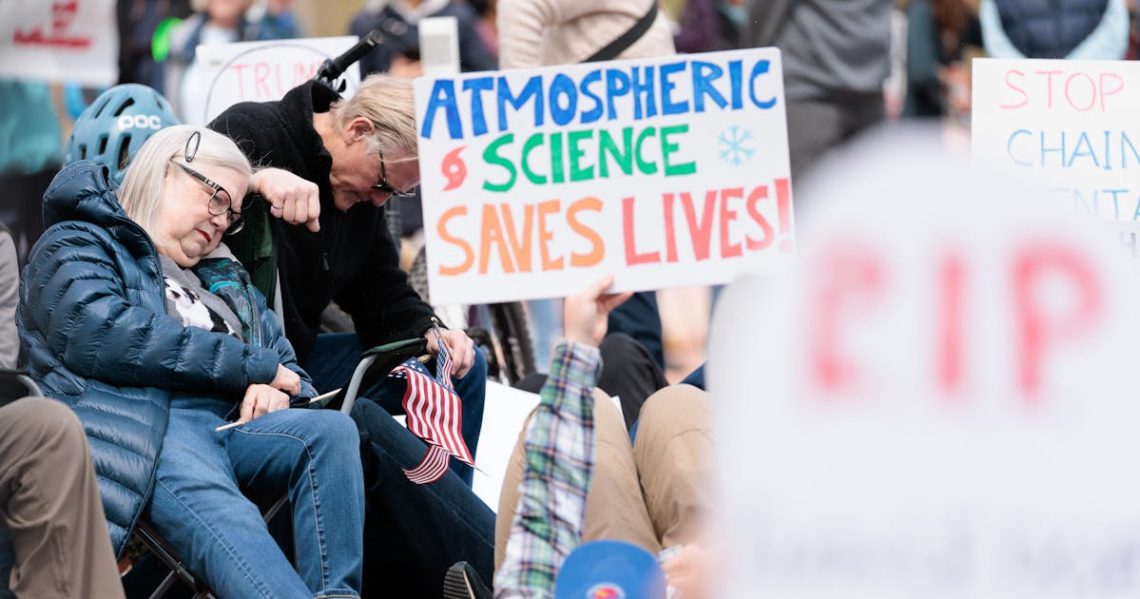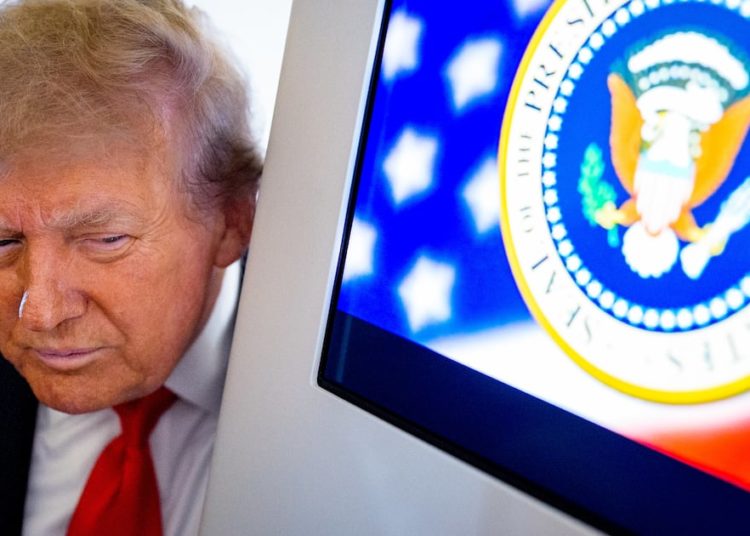American science appears to be in free fall. Donald Trump is eviscerating
research funding, persecuting the universities on whose contributions countless
scientific fields depend, and vastly complicating immigration for foreign
scholars, even going so far as to “aggressively
revoke” the visas of Chinese
students. His administration has threatened to withdraw Columbia University’s
accreditation and moved to ban Harvard University
from enrolling international students. If the United States was once among
the best places on earth to do scientific research—home to some of the
strongest universities, robust government investment, a spirit of innovation,
and an openness to collaboration—scientists
are now fleeing our shores in droves for China, Germany, or just about anywhere
else. Many who had dreamed
of spending at least part of their careers here are choosing not
to come. The institutions—from universities to the relevant government
agencies—are in disarray. It may take decades for them to recover.
Some of this was predictable. Trump has made no secret of
his hatred of immigrants, and certain areas of research—from climate change to
racial disparities in health care to vaccines—have been stigmatized as “woke” in
MAGA quarters. But it’s stunning that priorities like diabetes
and pediatric
cancer—hardly culture-war land mines—have been equally crushed by Republicans’
cost-cutting rampage.
How did we get here? “Trump” is the correct one-word answer,
but it’s also true that over the last decade and a half, liberal exhortations
to “believe in science” have not helped. The implication is that if you don’t believe in
it, you’re stupid. Trust the experts. Trust Harvard. It should surprise no one
that this was not a winning line of argument.
In 2016, Hillary Clinton declared, “I believe in science,”
when she accepted the nomination at the Democratic National Convention. Of
course—ominous narrator voice—we all know the outcome of that election. Nevertheless,
the slogan caught fire among liberals, and there quickly followed the 2017 and
2018 Marches for Science, inspired by Trump’s attacks on climate policy and
climate research. The rallies were well attended and well intended, but, as some
scientists feared, to many they came across as “another attack from a
condescending elite” and “a justification for the idea that science is somehow
biased.”
But the worst was yet to come.
During the pandemic, as many Americans, some conservative,
some just politically adrift, grew increasingly and often dangerously
suspicious of public health recommendations like vaccination, the liberal
shrillness on behalf of science reached unprecedented decibels. Reviving
Clinton’s smug proclamation of 2016, the even more grating “We believe in
science” often appeared on a sign preceded by the scolding reproach “In this
house.” To this day, you
can buy pins, T-shirts, mugs, and keychains asserting the belief. And even
more cringe variants exist: for example, a T-shirt that says, “The good thing
about science is that it’s true whether or not you believe in it.”
More an attitude than an argument, this “belief in science” claim
was snide. It suggested that those on the other side believed in what, witchcraft?
Worse, the “belief” was nearly as impervious to empiricism as its opposition. Few
of its loudest adherents would acknowledge nuance or apologize for error, even
as it turned out that the disbelieving dummies had at times been correct on
some pandemic matters: It was
probably never
necessary to wear a mask outdoors, schools
probably were closed for too long, Covid vaccines
may indeed pose some heart risks to young men. These
polarized discussions fueled the manifestly unfortunate rise of RFK Jr. and spawned
the Make America Healthy Again movement, which has attracted yoga moms and
fitness bros alike. Like those who dissented from liberal nostrums during the
pandemic, MAHA has been right about some things (microplastics
are terrible, our
children’s mental health is in peril, fluoride
in our drinking water has risks as well as benefits)
and horribly wrong about others (not
vaccinating kids, deliberately
allowing bird flu to spread).
But the worst thing about “I believe in science” is its cocky
assumption that “science” can be detached from opinions, interpretations, and,
especially, values and politics. That attitude has helped fuel a culture war
and left the majority struggling to defend science from the current crew of
right-wing wreckers in the White House, who may be wrong about most things but
understand that science takes place in an ideological rather than a theological
realm.
Trump’s attack on scientists and their institutions is philosophically
consistent with his other positions. MAGA hates public goods and collective
obligations, as well as foreigners and international cooperation. Without public
goods and internationalism, “science” becomes impossible. The values that MAGA objects
to—the grounds on which science is under attack—are precisely the values we
must defend.
Science requires public money to succeed at scale and is undertaken
primarily for the public good. Sure, private companies also do scientific
research, but not at the scale that the federal government funds it, and if a
private company does something important for society—as Moderna did when it developed
Covid vaccines—it’s federal government subsidies that make it possible. This
system assumes rightly that science benefits all of us. Anyone could need a
cure for cancer someday, desire to live in a thriving natural environment, or feel
curious about what’s going on in outer space. That sense of the public interest
is anathema to this White House, which sees little value in the public sector.
Trump’s worldview is like Margaret Thatcher’s—the U.K. prime minister famously
said, “There is no such thing as society”—but his individualism is more extreme because there is no subject more interesting to him, no interest group more
pressing, than himself. What good is science to Trump personally?
The right also hates science because it requires cooperation
across borders. To most effectively advance knowledge and research, individuals
from different countries must put their heads together, co-author studies,
accept each other’s postdoctoral students, visit, immigrate, speak. This sort
of exchange makes no sense to MAGA. The assumption of the Trump White House is
that people from other countries have nothing to offer us and are, in fact,
dangerous to our national security.
There’s a third, more complicated ideological pillar to
Trump’s attack on science, and this is anti-elitism. Some science—though
hardly the majority—takes place at Ivy League institutions like Harvard. This
White House hates such places, not, as it claims, because of “antisemitism”—MAGA
doesn’t mind antisemitism and bigotry in other contexts—but because the
anti-elitism of attacking the Ivy League always plays well. Selective
admissions breed resentment, since most people can’t get in. Worse, the Ivies
are overwhelmingly dominated by the rich, as extensive studies by The New
York Times, Thomas Piketty, and others have found. While the research done
by Ivy League scholars is a critical public good, it is also a scandal that institutions
more exclusive than most country clubs are allowed to enjoy tax-exempt status
and government funding. Those of us to the left of Trump need to welcome a more
honest conversation about these institutions. Should they even enjoy nonprofit
status? To keep their public funding and tax exemptions, should they have to do
more public service? Serve more low-income students, turn their real estate
holdings into affordable housing, institute open admissions? Or should they
simply be nationalized and run as public institutions?
But as usual, the Ivy League is a distraction. Most
universities aren’t highly selective, many are already public, and most
bring substantial economic benefits to their communities. Scientific
research is essential to the prosperity of many American cities and towns,
where the university is the main employer. College-centered
towns are some of the fastest-growing in the United States, and in many
places higher education has replaced manufacturing as
the industry that brings jobs, money, and vitality. You
might say that before this year, science was making America great again.
Trump’s necrotic attack on all human inquiry imperils all
that. What is needed in defense of science is not patronizing assertions of
belief but, instead, clear arguments about why we need it. It’s odd that the
economic rationale is getting short shrift when so many communities depend on STEM
and universities. We must also acknowledge
that some of the reasons the right hates science are exactly the reasons to
defend it. People who don’t believe in public goods will not believe in
science, but everyone else should. Science saves lives by advancing medicine; millions
of Americans know someone whose life or health has been saved by an advance in
medical research funded by the federal government. The internationalism of
science should also be defended: Bringing the best minds together from around
the world is not only crucial for science, it functions as citizen diplomacy, fostering
the international understanding and cooperation that is much needed in a world
of strife.
Harvard University has a
P.R. campaign, in defense of itself, making some of these arguments,
especially for medical science, but I’m not sure it helps to hear these claims from
institutions with so much elitist baggage. Better to hear from Penn State, or
the United Auto Workers—full disclosure: my union—which represents not only
autoworkers but thousands of scientists, and has been rallying
in defense of scientists and science as a good benefiting—and belonging to—the
working class.
When we fight for science, it’s worth going back to the
foundations of the value system we are defending. Next month will be the eightieth
anniversary of “Science:
The Endless Frontier,” a report made to Franklin Delano Roosevelt by his
director for scientific research and development, Vannevar Bush, outlining the critical
role that the government should have in the scientific project, and why. In
asking for the 1945 report, FDR wrote: “New frontiers of the mind are before
us, and if they are pioneered with the same vision, boldness and drive with
which we have waged this war we can create a fuller and more fruitful
employment and a fuller and more fruitful life.” That’s the kind of energy we
need right now.
The post Science Badly Needs Defending Right Now. It Doesn’t Need Your Belief. appeared first on New Republic.




